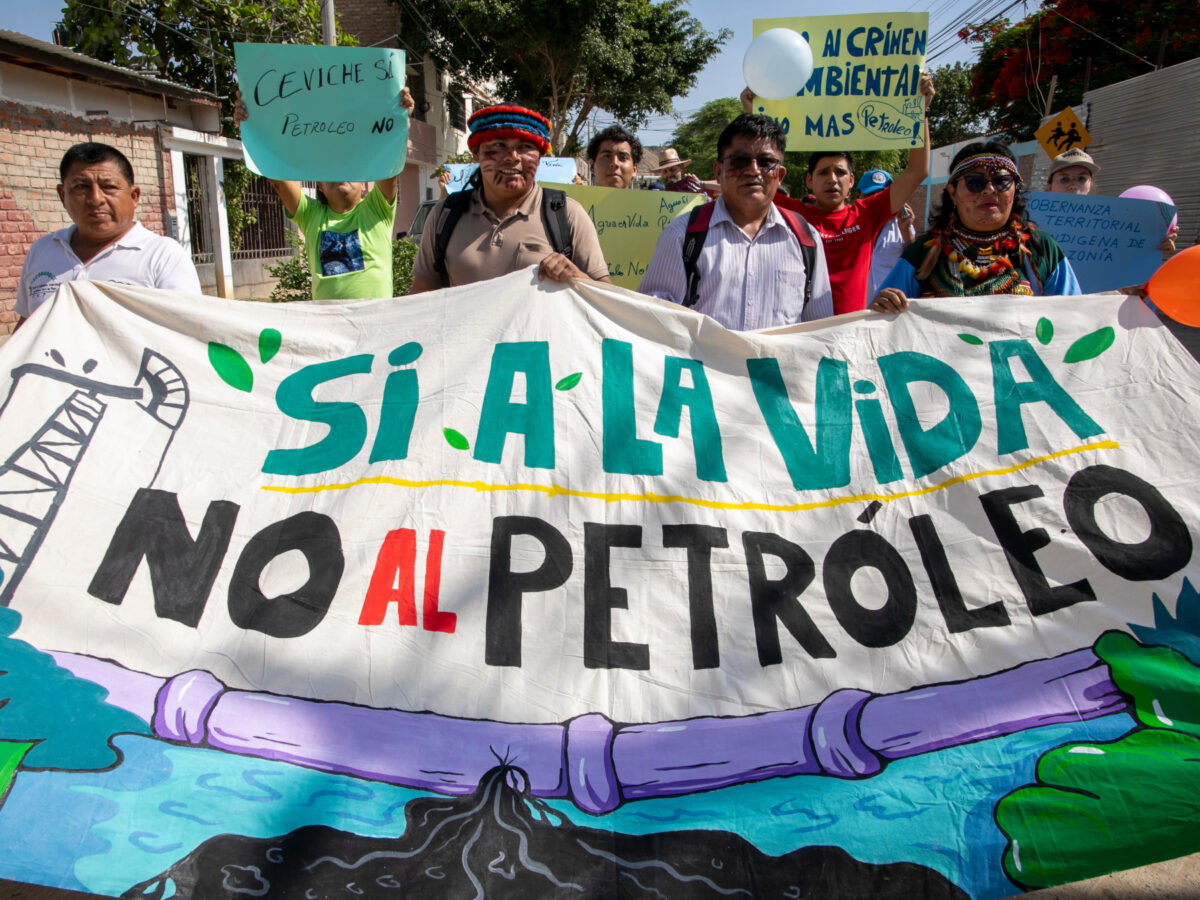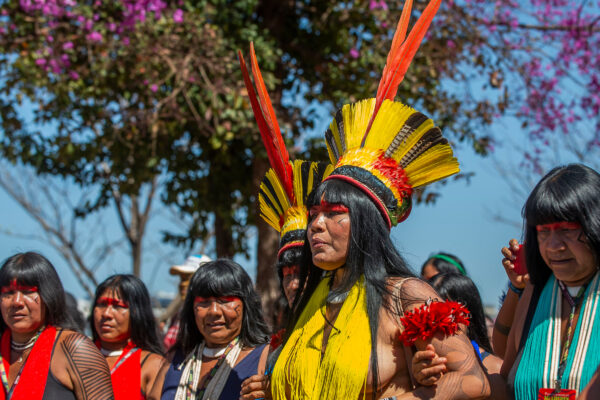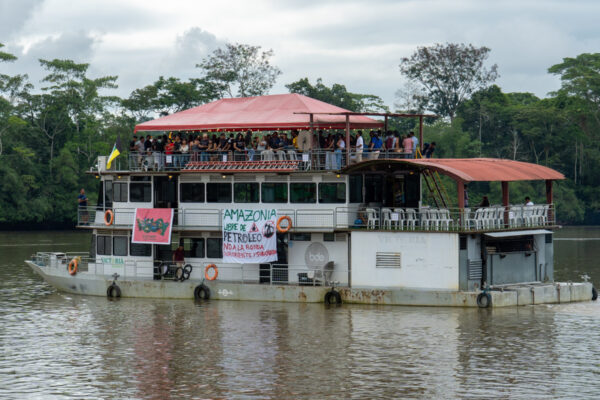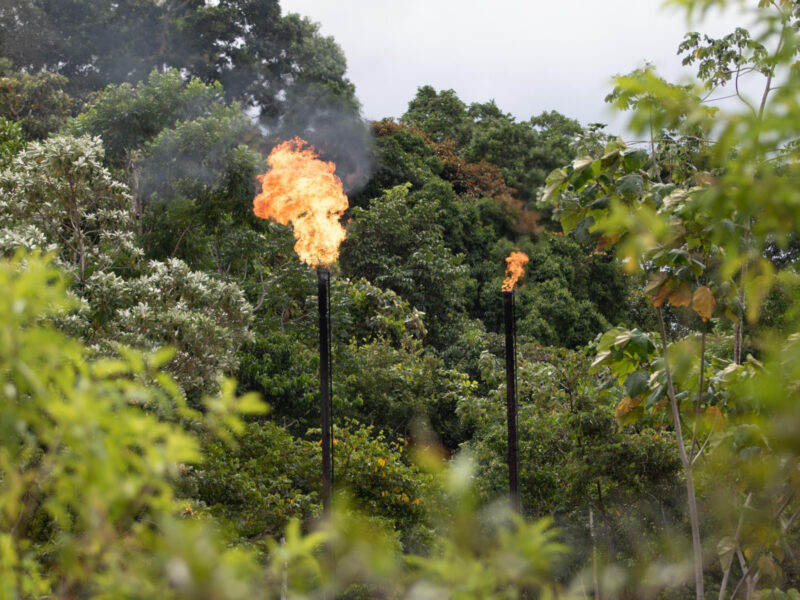Yesterday, Indigenous nations from both sides of the Peru–Ecuador border made history by uniting in a powerful binational alliance to defend the Amazon.
In a public letter, seven Indigenous nationalities – the Achuar, Wampis, Chapra, Sápara, Shiwiar, Kichwa, and Andoa – collectively rejected a cross-border oil agreement between Petroperú and Petroecuador that threatens their territories, cultures, and the rainforest itself.
Their unprecedented declaration marks the first formal alliance of its kind to oppose the interconnection of oil infrastructure across national borders in the Amazon. This united front builds on a track record of resistance: in more than 25 years of attempts, no new oil well has been drilled in Ecuador’s southeastern Amazon – a testament to the strength and resolve of Indigenous opposition that has repeatedly derailed oil expansion in the region.
Amazon Watch stands in firm solidarity with our Indigenous partners and allies in this opposition. We have worked alongside these nationalities for decades, and we will continue to support their resistance to these reckless plans for oil expansion and pipeline construction.
This moment is not just about stopping one pipeline. It’s about rejecting a model of development rooted in extraction, contamination, and colonialism – and standing for a future grounded in Indigenous autonomy, climate justice, and life.
What’s at stake: A new oil frontier built on old lies
At the heart of this resistance lies Ecuador’s so-called Southern Oil Round – a massive licensing auction planned for early 2026 that would open up 2.3 million hectares of pristine rainforest to oil drilling.
But the proposed blocks are far from any existing infrastructure, prompting Ecuador to explore export routes through Peru via the notoriously leaky North Peruvian Pipeline (ONP), which averages 146 spills per year and runs directly through Indigenous territories.

A recent Amazon Watch threat assessment, Drilling Toward Disaster, reveals that these expansion plans are not only catastrophic for the environment – they’re illegal and financially unviable. The report emphasizes that Indigenous opposition has already derailed previous rounds of oil auctions in the region. In over 25 years of attempts, not a single new well has been drilled in Ecuador’s southeastern Amazon.
Now, in a desperate move to attract investment and pay off national debt, the governments of Ecuador and Peru are reviving rejected projects and ignoring the fundamental rights of Indigenous Peoples. The latest agreement was signed without any prior consultation – a direct violation of both countries’ obligations under ILO Convention 169, the UN Declaration on the Rights of Indigenous Peoples, and national constitutional law.
“Not one drop more”: Indigenous unity across borders
This historic declaration was signed by organizations representing communities across the Amazon Basin: from the Sápara, whose territory was recognized by UNESCO as an “Intangible Cultural Heritage of Humanity,” to the Achuar and Wampis, whose resistance helped force out multinational oil giants like Occidental Petroleum and GeoPark from Block 64 in northern Peru.
The message is unequivocal: No oil project can move forward on these lands without Free, Prior, and Informed Consent – and that consent has not been given.
Ecuador’s Block 86, the epicenter of the Southern Oil Round, overlaps the titled territory of the Shiwiar Nation. Just a dozen kilometers from the ONP, it’s seen by Petroecuador as the linchpin of a new binational oil export corridor. But for the Shiwiar, and all the nationalities who’ve spoken out, this plan is an existential threat – not a development opportunity.
Their coordinated statement also denounces the proposal as a dangerous contradiction of global climate science. Multiple U.N. agencies and the International Energy Agency have called for an immediate halt to new oil development to avoid climate collapse. Pushing forward with oil expansion in one of the planet’s most critical carbon sinks – the Amazon – is nothing short of climate denial.
A call to action: We will not let this pipeline be built
This is more than a policy dispute. It’s a frontline defense of life.
Amazon Watch’s Drilling Toward Disaster report outlines the deadly combination of climate, legal, and operational risks associated with the Southern Oil Round. They include an aging and spill-prone pipeline network, inadequate consultation procedures, deeply divided public opinion, and the looming threat of legal action from both Indigenous and international courts.
The binational resistance we’re witnessing today is a warning – to investors, banks, and oil companies – that this project is not viable. It has no social license, no environmental guaranties, and no legal standing.
Amazon Watch calls on all financial institutions to respect Indigenous self-determination and steer clear of this doomed project. We urge governments, particularly in the Global North, to stop importing Amazon crude and fueling this destruction. And we invite our global allies to stand with the Indigenous nations of the Amazon as they once again rise in defense of their homelands – and our shared climate future.
Amazon Watch has also taken strategic action closer to home, pressuring California to sever its reliance on Amazon crude. In June, a delegation of Indigenous leaders from Ecuador’s Amazon paddled kayaks outside Chevron’s Richmond refinery to draw attention to the link between California’s fuel consumption and rainforest destruction. Their visit galvanized the state Senate to introduce a landmark resolution urging an official review of California’s Amazon crude imports and challenging the state to end its “addiction to Amazon crude” and its complicity in deforestation and Indigenous rights violations. That resolution is expected to reach the full Senate for a vote in a matter of weeks.
“We are in a state of alert. We will not allow our territories to be sacrificed for oil.”
“California can no longer claim climate leadership while powering its cars and industries with oil from the Amazon,” the statement concludes. “Ending these imports is a critical step to protecting our peoples, our rivers, and the planet.”
This is the front line of climate justice – where oil roads cut through ancestral lands, where rivers run black with spills, and where Indigenous communities are saying: enough.














